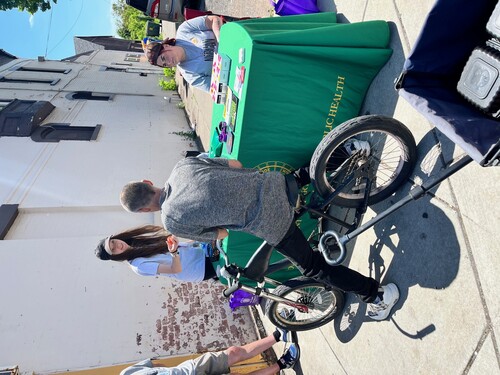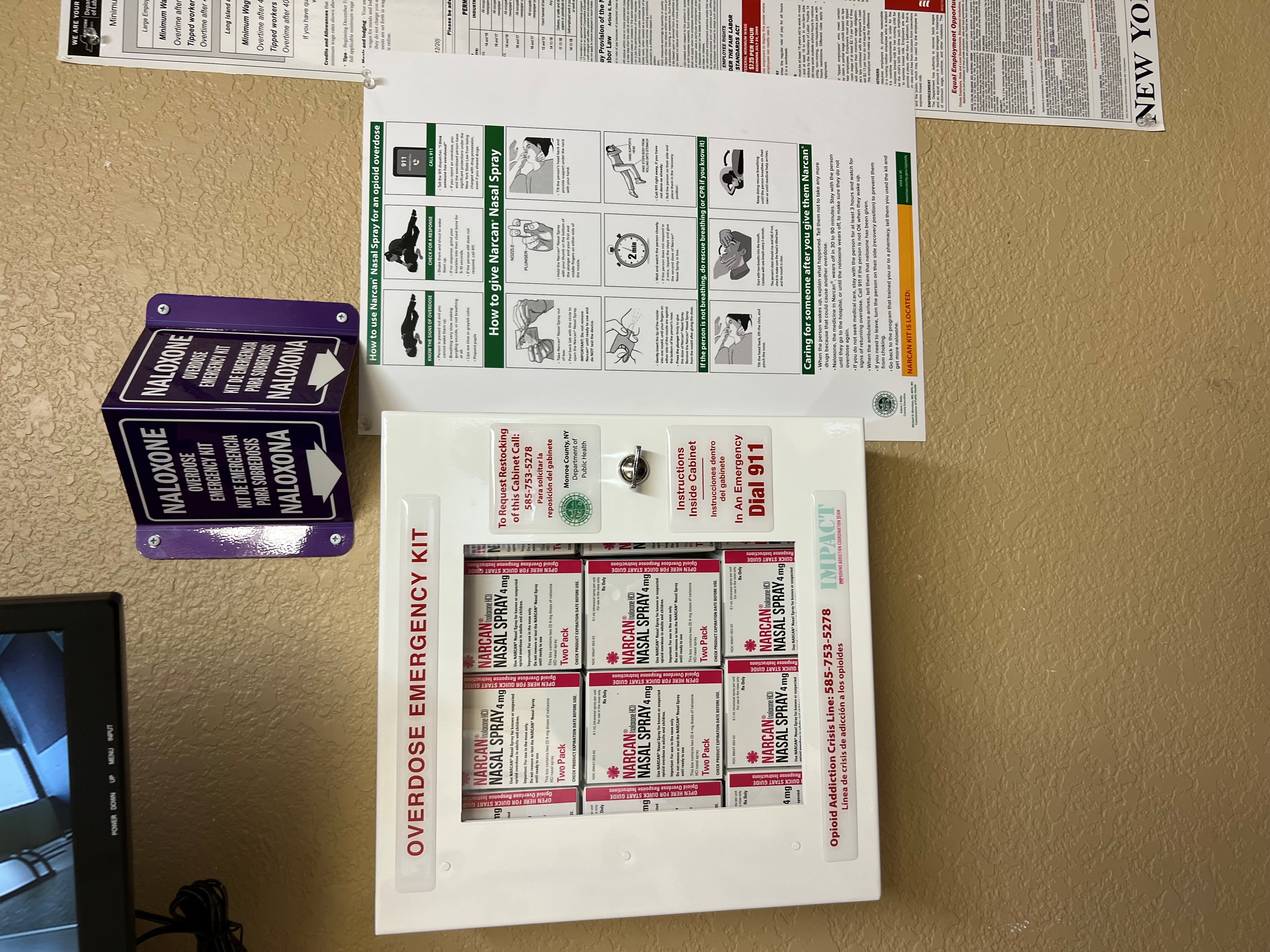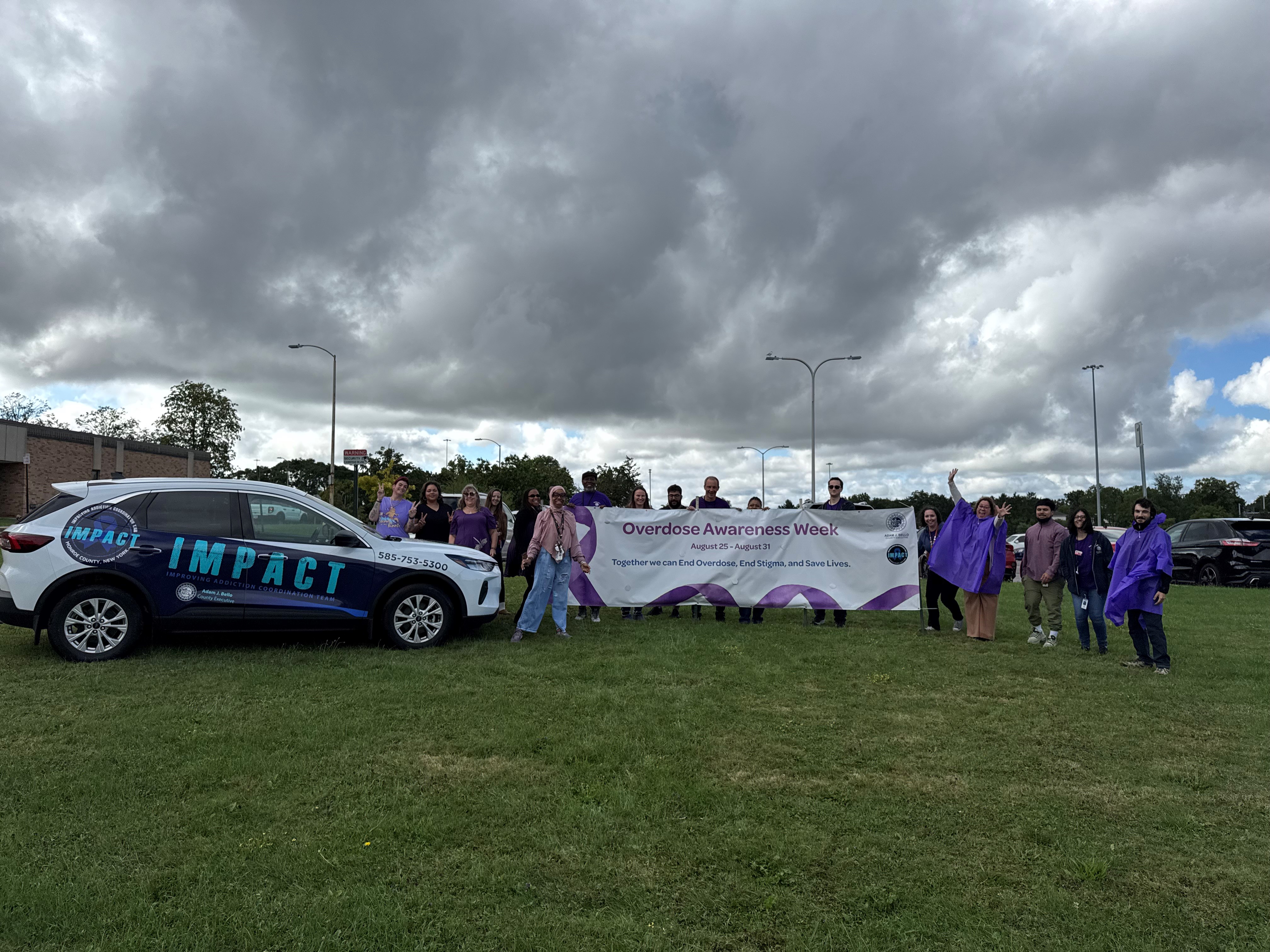Monroe County Department of Public Health Opioid Initiatives
The health department is committed to using our funding to combat the opioid epidemic in a responsive and ethical manner. We use data to drive all decisions, developing programs that address the demonstrated needs of Monroe County residents. We systemically address barriers that prevent individuals from getting desired support towards recovery, and serve groups that are disproportionately affected by substance use disorder. Our programs are intentional, mindful, person-centered, humanistic, and transparent. These values have been key in helping us earn trust and respect from the community, which has in turn maximized our ability to effectively support them.
Current initiatives
Post-Overdose Response
Our team responds to individuals who have experienced an overdose in Monroe County within 24 to 48 hours, providing Naloxone and harm reduction resources. The team connects individuals with care management services, treatment options, and other community resources.
Street Outreach
Our team is in the community every day of the week, offering life-saving naloxone (Narcan) and creating human connections in efforts to help individuals find a path toward treatment for substance use disorder. Using the latest data available, outreach specialists conduct street-level outreach in areas where overdoses are most prevalent.

Naloxone Box Program
Our team installs, monitors and re-supplies Naloxone Boxes within Monroe County. Naloxone Boxes provide free, publicly accessible naloxone throughout Monroe County. To date over 600 Naloxone boxes have been installed in Monroe County. Find free Naloxone near you using our Naloxone Box Locator map.

Community Education
- IMPACT Team Tabling: Our trained staff are health ambassadors in the community, present at community events 7 days per week to provide education and materials on substance use, overdose prevention, and community resources. Find our team at various venues including: businesses, churches, community organizations, colleges, and health fairs throughout Monroe County.
- “Get It Done” Network: We partner with Common Ground Health to provide opioid education and naloxone distribution to at-risk individuals and their social networks through local barber shop Community Health Educators (CHEs). (link to Common Ground Health website)(embed GID network video)
Narcan Training
Our trained staff is able to provide on-site naloxone and harm reduction training. Public trainings are scheduled monthly and pre-registration is available. During Narcan training, participants learn about:
- the Opioid Epidemic and its impact on our community
- the addiction cycle and the physiological changes substance use has in a person's body
- how Naloxone works to reverse an overdose
- how everyone can help save lives
For more information about training, click here
Addiction Service Crisis Hotline
In 2022, Addiction Services opened a 24/7 Crisis support and resources line, staffed by trained MCDPH Addiction Services staff. Our staff processes calls from community members for information, harm reduction supplies, naloxone, crisis support, and connection to treatment. Call 585-753-5300 to be connected with our team.
Call-to-Action Campaigns
A 5-year campaign plan to empower the community towards harm reduction and support of individuals with SUD. Billboards, coasters, printed materials, videos, and radio ads.
Trend Analysis and Public Dashbaord
Using emergency call data, we analyze the locations of overdose incidents (type and frequency), driving our decision making for street outreach and all initiatives. The Division of Epidemiology and Disease Control delivers a public dashboard providing weekly up-to-date information on overdose in Monroe County.
Community Action Coalition Committed to Uprooting Stigma (CACTUS)
Stigma can be one of the biggest barriers to treatment options and support for individuals who are experiencing a substance use disorder. Community Action Coalition Committed to Uprooting Stigma (C.A.C.T.U.S.) was created to address and educate communities on the existing causes and harmful effects of stigma in effort to eliminate stigma surrounding substance use disorders. Our mission is to dismantle the harmful stereotypes and discriminatory practices that perpetuate stigma surrounding substance use and co-occurring concerns. We want to empower our communities through education, resources, support, and compassion. For more information, contact Addiction Services at 585-753-5300 or [email protected]
Peer Workforce Development
We partner with ROCovery Fitness to provide Certified Peer Recovery Advocate (CRPA) certification and licensure to individuals with lived experience. CRPA professionals play a crucial role in treatment and recovery services, fostering community, enhancing motivation and improving recovery outcomes.
First Responder Leave Behind Program
In partnership with first responders at Rochester Police Department, Rochester Fire Department, and AMR, we execute a leave-behind program for families and bystanders at on the scene of an overdose. These materials and resources equip community members with lifesaving naloxone in the event of a future overdose, and crucial resource to guide conversations around recovery and treatment. For more information about this program, please call 585-753-5300 or email [email protected]
Safe Drug Disposal and Pharmacy Education Program
Deterra drug disposal bags and safe disposal education are provided to local partner pharmacies to promote safe drug disposal. For more information about this program, please call 585-753-5300 or email [email protected]
Pharmaceutical Take-Back Programs
High School Overdose Education and Prevention
High School students in partner districts receive customized presentations on addiction and drug trends by an individual in recovery, who shares their story of hope and inspiration. If interested in receiving this presentation, please call 585-753-5300.
Bar and Restaurant Partnership
Our team provides specialized and targeted education and overdose prevention supplies to bar and nightclub patrons in the community through tabling and walking outreach. In addition, 33 bar and restaurant owners partner with the health department to host Naloxone Boxes.
University Outreach
Through the data we receive, we know a number of overdoses are taking place on college campuses. We partner with all Monroe County colleges and universities to provide education on addiction, drug trends, and overdose prevention and reversal through training, tabling, and outreach. If interested in having us visit your campus, please call 585-753-5300.
Interfaith Collaboration
Partnership with various faith communities to provide education on substance use and overdose prevention. If interested in partnering with us, please call 585-753-5300.
Spokes and Folks
We have expanded our outreach to include harder to reach areas of Monroe County, truly meeting individuals where they are. Our Spokes and Folks team travels by bike, interacting with community members on canal paths, in parks, at local festivals, and in various bike-friendly areas of the community.

Overdose Awareness Day
We honor International Overdose Awareness Day, a global annual campaign to end overdose and honor individuals who have lost their lives to fatal overdose, through a series of county-sponsored events and activities.

Grief Support for Substance-Related Loss
We offer free in-person peer support groups during daytime hours and virtual zoom meetings during evening hours for those grieving the loss of a loved one related to substance use. For more information or to register, click below.
Grief Support for Substance Related Loss
Language Access Initiative
We ensure language access to our resources and services through data analysis, language mapping, interpretation services, and translated physical materials.
Past initiatives
Peer Opioid Education and Naloxone Distribution
In partnership with New York Recovery Alliance, we provided opioid education and naloxone distribution to at-risk individuals and their social networks through peer education and naloxone distribution.
Healing Communities Study
The HEALing Communities Study (HCS) was the largest addiction prevention and treatment implementation study ever conducted. Launched in 2019, the study took place in 67 communities across Kentucky, Massachusetts, New York, and Ohio. Rochester was chosen as the urban community of focus in New York State. Through this study we launched 23 initiatives and a community coalition, most of which have carried on into the current work of our division. Findings from the study established best practices for integrating prevention and treatment strategies that can be adapted by communities nationwide.
For More Information Click Here
Overdose Data to Action grant
Monroe County Division of Epidemiology and Disease Control participated in the Overdose Data to Action (OD2A) grant awarded by the Centers for Disease Control (CDC). CDC created OD2A to address the overdose crisis, close gaps in prevention, enhance surveillance, and coordinate communication between local health departments.













